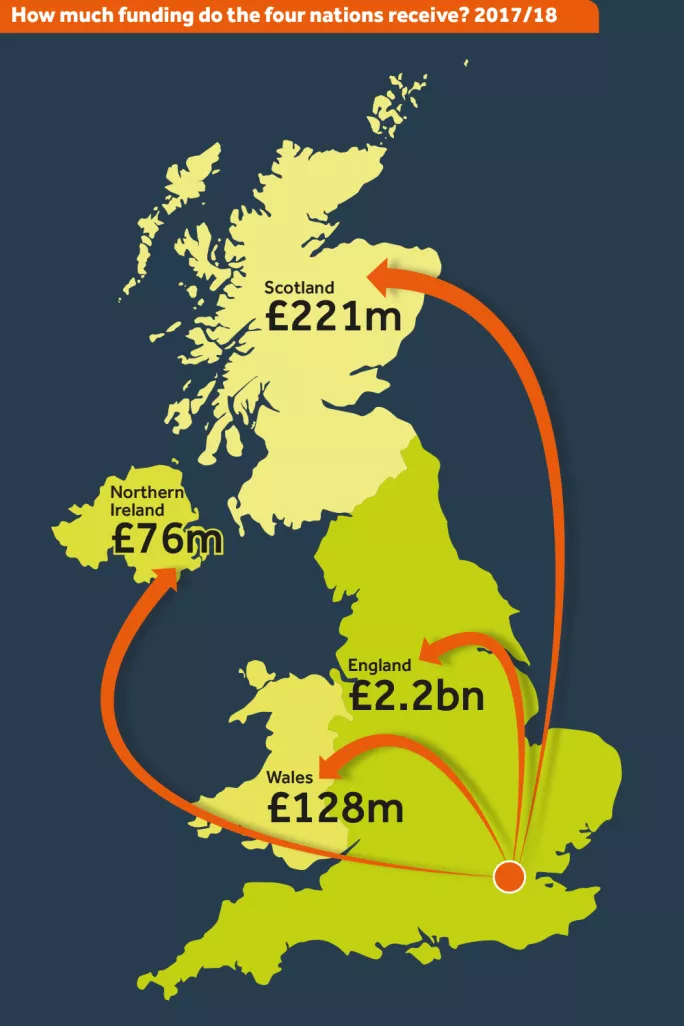Apprenticeship levy must work harder to cross UK borders

The apprenticeship levy was meant to finance the UK government’s flagship policy of 3 million apprenticeship starts by 2020. Paid by all employers across the UK with a payroll of more than £3 million, it was to raise almost £3 billion annually.
But from its inception, the levy has been the subject of much controversy. It is yet to lead to the desired increase in the number of people starting apprenticeships - in fact, numbers dropped dramatically in the months after the levy was introduced.
Sector leaders have argued that it lacks flexibility and that some employers might simply re-badge existing training into apprenticeships. Most recently, a report by the CBI called for the apprenticeship levy to “evolve” into a “flexible skills levy” so firms can fund training for their staff “whatever the form of high quality course they do”.
The Treasury estimates that 2 per cent of UK employers pay the levy. But a Tes analysis highlights the disparities across the UK in how beneficial the introduction of the levy has been to employers and the wider apprenticeship and training systems.
To encourage large employers to take on apprentices and help boost numbers, levy-paying businesses in England are given access to a digital account, allowing them to fund apprenticeship training to the value of their levy payment. But while large businesses in all four UK nations pay the levy, only those in England benefit from these digital accounts (see case study, opposite).
With skills policy a devolved matter, Scotland, Wales and Northern Ireland instead receive a population-based share of the proceeds under the Treasury’s Barnett formula - to be invested as ministers see fit.
And although all UK nations have committed to spending these funds on education and skills, only a small proportion of the plans outlined by Scottish, Welsh and Northern Irish administrations directly benefits employers.
Neil Carberry, managing director for people and infrastructure at the CBI, says: “Since the beginning, the CBI has pointed to the significant cross-border issues being created by the way the levy has been rolled out.”
He adds that the “best approach” would be to give the same powers to employers across the UK. “They have to be able to access high-quality training for their staff,” says Carberry.
The levy and Scotland
Last year, the Scottish government announced a £10 million Flexible Workforce Development Fund (FWDF), available to organisations across the private, public and third sectors who are subject to the levy - less than 5 per cent of the £221 million received by the Scottish government from the apprenticeship levy in 2017-18.
Now, Scotland’s further education minister has told Tes its plans to let employers benefit further have been thwarted by Westminster, with Scottish policy makers unable to obtain information from Westminster colleagues on which Scottish employers pay the apprenticeship levy. According to government estimates, there are in the region of 4,000 levy paying employers in Scotland.
FE minister Shirley-Anne Somerville says the levy was “not a policy of this government’s choosing”, and “the administration of it is not something which is helpful, either, when we have a levy that is paid by certain employers, but Her Majesty’s Revenue and Customs (HMRC) won’t tell people who these employers are so we can get the information to then allow them to have full access to the funding”.
She says the Scottish government is encouraging large employers to take up the opportunities such as the FWDF and colleges to be in contact with their local employers “as best as they can”.
A spokeswoman for the Scottish government adds that the way in which the levy has been implemented does not reflect the “long-established and well-founded system we have in place for apprenticeships and other training opportunities”.

The levy and Wales
The Welsh government delivers its apprenticeship programme through the Welsh apprenticeship provider network and currently does not offer anything similar to the digital accounts system in England.
Ian Price, director of the CBI in Wales, says the Welsh apprenticeship levy system is now bedding down after months of uncertainty “caused by the [Welsh] government preference for a supply-driven approach rather than a digital voucher system”.
He says the government’s approach has led to some larger firms in Wales training more apprentices in England “to benefit from the clarity provided by the English system”. However, he adds he is confident the Welsh government is committed to address this issue.
A Welsh government spokesman adds that the devolved administration views the apprenticeship levy as “a UK government imposed employment tax” that “completely overlooks and undermines our very distinctive approach to supporting apprenticeships”.
He adds: “Its introduction has come at a considerable cost to Wales and any Barnett consequentials we have received from the levy have been largely offset by cuts made elsewhere, meaning there is no significant new money coming to Wales.”
The levy and Northern Ireland
Like Scotland and Wales, Northern Ireland has a distinct apprenticeship and training system. The devolved administration stresses that cuts to the overall funding they receive from Westminster have offset much of the funding received as a consequence of the levy.
A spokesman for the Northern Ireland executive says HMRC has not provided information regarding the employers in Northern Ireland who pay the levy and how much is raised.
“In the 2017-18 year the UK government have allocated the Northern Ireland executive a Barnett consequential of £76 million from the apprenticeship levy. However, the cessation of funding for existing apprenticeships in England means a Barnett consequential loss of £52 million. There is also a £27 million levy on our public sector. This means there is no overall increase to the executive’s budget.”
He explains the executive has developed a specific apprenticeship system to meet the needs of the Northern Ireland economy in line with employers’ requirements.

A spokesman for HMRC says skills policy is devolved and it is therefore right that the devolved nations get their share of the levy. The department also says the fact many large employers have employees working across the UK mean HMRC cannot provide a robust regional breakdown. There are also issues of taxpayer confidentiality in sharing who pays the levy, the sum in their accounts, regional shares of workforce and amounts spent.
You need a Tes subscription to read this article
Subscribe now to read this article and get other subscriber-only content:
- Unlimited access to all Tes magazine content
- Exclusive subscriber-only stories
- Award-winning email newsletters
Already a subscriber? Log in
You need a subscription to read this article
Subscribe now to read this article and get other subscriber-only content, including:
- Unlimited access to all Tes magazine content
- Exclusive subscriber-only stories
- Award-winning email newsletters